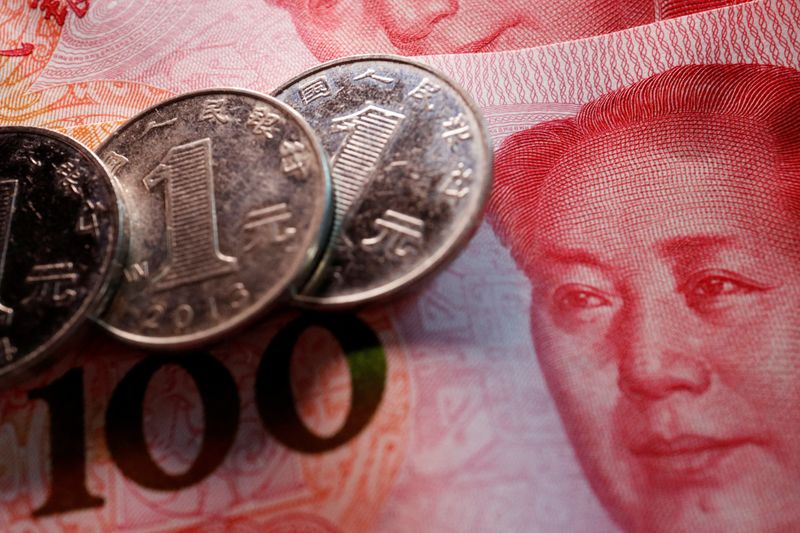SHANGHAI/BEIJING (Reuters) - China's monetary authorities took forceful action against a sliding currency for the first time in nearly eight months on Tuesday, with the country's state banks acting to put a floor under the yuan even as officials pledged more stimulus for the flagging economy.
The People's Bank of China (PBOC) set a stronger-than-expected trading band for the yuan and state banks sold dollars, market sources said, in the strongest sign yet the authorities are growing increasingly uncomfortable with the yuan's quickening slide.
The yuan has fallen about 4% on the dollar in two months as flagging consumer confidence and a soggy property market have sapped momentum from the post-pandemic recovery. It bounced about 0.4% on Tuesday, its best gain in almost two weeks.
"There is weariness that the yuan weakness may have got to the point where the currency weakness could affect confidence that in turn fuels currency weakness, and there is a need to kind of make sure that we don't spiral into that kind of a situation," said Moh Siong Sim, a currency strategist at Bank of Singapore.
"They are sending more signals now they're uncomfortable... they would like to slow the yuan weakness."
The push back comes as investors sour on China, with data showing China's vaunted rebound faltering. Still, the stuttering recovery has stoked expectations of stimulus to help offset growth worries, something even mainland authorities have been more vocal about.
Addressing a World Economic Forum summit in Tianjin, Premier Li Qiang said China will take steps to boost demand and invigorate markets, although he didn't provide details.
Analysts said the PBOC's massaging of the yuan's moves could slow but perhaps not halt a decline, given the dour economic outlook. Wall Street bank JPMorgan (NYSE:JPM) said it was staying "bearish" on China's yuan and expected the central bank to step in again to prevent the move accelerating.
China is not alone with unease at its currency's downward momentum, driven in major part by widening yield differentials with the hawkish monetary regimes in other major economies.
Japan's finance ministry has also issued warnings this week at what it sees as a rapid and one-sided yen decline, and top yen diplomat Masato Kanda said he is "not ruling out any" options to arrest the near 10% decline in the yen in a matter of weeks.
FIXING THE YUAN
The yuan ended Monday at a seven-month low of 7.2425 per dollar but rose to 7.2058 on Tuesday.
State banks were selling dollars to buy yuan in the offshore spot market, according to four people familiar with the trades, and that appeared as the currency neared the psychologically important 7.25 per dollar level, two of the people said.
The banks were also active late on Monday, according to two more traders, when they bid up the yuan sharply into the onshore close, which influences the central bank's official yuan midpoint fixing the next day.
On Tuesday, the People's Bank of China (PBOC) set the middle of the band even firmer than expected, deviating from forecasting models by the most since May.
"The 7.25 level remains a key threshold," said one of the market sources, adding that a breach of the level could quickly send the yuan to lows last seen in 2022.
In November, the currency hit a 14-year trough of 7.3280 per dollar, while the offshore yuan touched a record low of 7.3746.
All the sources spoke on condition of anonymity as they are not authorised to speak about trades publicly. UBS said in a note that its trading desk saw heavy interest among banks in pre-market trades to procure dollars via buy-sell currency swaps, and said there might have been efforts by the authorities to neutralise the impact from their spot intervention.
State banks were also suspected of smoothing the yuan's decline last month, albeit minimally.
State banks usually act on behalf of the country's central bank in the foreign exchange market, but they could also be trading for themselves or their clients.
"What could really stabilize the Chinese currency is... they probably need to stabilize the growth expectations. There is a need to address that worry," Sim said.
Analysts said moves to halt the yuan's slide were not yet as firm as last year, when regulators rolled out measures to encourage capital inflows, but might be enough to slow selling.
Still, both stimulus and efforts to put a floor under yields are needed, analysts say, to keep the yuan from slipping further.
"We've got to be thinking about the likelihood of further easing ahead," said Rob Carnell, ING's regional head of research, Asia-Pacific.
"What we've seen is just the first iteration of the rate cuts that we're going to get. We're going to get plenty more of those over the next couple of months," said Carnell.
"That's got to keep yuan on the back foot."
